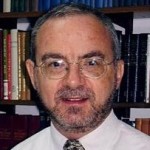 Edit article
Edit articleSeries
In the Footsteps of Leibowitz: Kasher, Levinger, Goldman and Schwartz

A Conversation Prof. Leibowitz Yaakov Levinger and Eliezer Goldman
A Conversation Prof. Leibowitz Yaakov Levinger and Eliezer Goldman
The appeal of Leibowitz’s “no-nonsense” approach to the biblical text is evident in the writings of a number of younger disciples affected by his thought, such as Israeli philosophers Asa Kasher, Yaakov Levinger, and Eliezer Goldman. Indeed, a radical aversion to metaphysical claims serves as the linchpin of Goldman’s comprehensive program for “religion without illusions.” Goldman re-iterates views similar to those of Leibowitz regarding the unbridgeable chasm between man and a transcendent God, and replicates the latter’s resistance to grounding religious obligation on claims that draw upon empiric evidence or anthropological interests – albeit in somewhat milder form.[1]
Some contemporary biblical scholars, whose research precludes relating to traditional accounts of the origins of the biblical text as factual descriptions, appear to share Leibowitz’s predilection for a naturalistic view of revelation as well. For these individuals, all of whom are personally committed to an Orthodox way of life, belief in the divinity of the Torah might amount to no more than affirmation of the Rabbinic understanding that the proper way to approach God is by submitting to Scripture’s commands, as defined by the Oral Law. Whether any one verse or the Torah as a whole was literally dictated by God to Moses is a minor issue for one who accepts this basic message.

A notable representative of this approach is Baruch Schwartz. In his opinion, what is most important to the religious life is recognition of the primacy of divine command. In the wake of Leibowitz, he too believes that this entails commitment to abide by the constitutive guidelines of the halakhic tradition and to submit to its internal authority, even when this mandates over-riding contrary humanistic considerations. [2]
TheTorah.com is a 501(c)(3) nonprofit organization.
We rely on the support of readers like you. Please support us.
Published
March 25, 2014
|
Last Updated
September 22, 2025
Previous in the Series
Next in the Series
Before you continue...
Thank you to all our readers who offered their year-end support.
Please help TheTorah.com get off to a strong start in 2025.
Footnotes

Prof. Tamar Ross is Professor Emeritus of the Department of Jewish philosophy at Bar Ilan University. She continues to teach at Midreshet Lindenbaum. She did her Ph.D. at the Hebrew University and served as a post-doctoral fellow at the Center for Jewish Studies at Harvard. She is the author of Expanding the Palace of Torah: Orthodoxy and Feminism. Her areas of expertise include: concepts of God, revelation, religious epistemology, philosophy of halacha, the Musar movement, and the thought of Rabbi A.I. Kook.
Essays on Related Topics:









